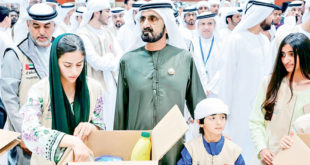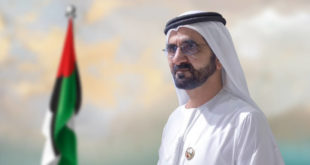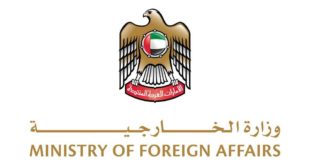▪ سلطان الجابر يلّقي كلمة في الاجتماع الوزاري حول الطاقة النظيفة ضمن فعاليات اجتماع مجموعة العشرين الـ 14 حول الانتقال في قطاع الطاقة المنعقد في ولاية غوا الهندية.
▪ الرئيس المعيَّن لـ COP28 يشيد بدور الهند والدنمارك في قيادة العمل على اكتساب الزخم اللازم لتعهد التبريد العالمي مع أكثر من 20 من أوائل المنضمين للتعهد.
سلطان الجابر:
• بفضل رؤية وتوجيه القيادة في الإمارات، نواجه التحديات بذهنية إيجابية لنخلق منها فرصاً واعدة، ونعمل على تعزيز التعاون مع الأصدقاء والشركاء في أنحاء العالم لدعم العمل الجماعي من أجل تحقيق التنمية المستدامة وبناء مستقبل أفضل للأجيال الحالية والقادمة.
• بالتعاون والشراكة ومضاعفة الجهود، يمكننا تحويل تحدي التبريد إلى فرصة.
غوا – الهند في 22 يوليو/ أكد معالي الدكتور سلطان بن أحمد الجابر، وزير الصناعة والتكنولوجيا المتقدمة الرئيس المعيَّن لمؤتمر الأطراف COP28، أنه تماشياً مع رؤية القيادة في دولة الإمارات، تركز رئاسة المؤتمر على التعامل مع التحديات بذهنية إيجابية لتخلق منها فرصاً واعدة، وتحرص على تعزيز التعاون مع الأصدقاء والشركاء في أنحاء العالم لدعم العمل الجماعي من أجل تحقيق التنمية المستدامة وبناء مستقبل أفضل للأجيال الحالية والقادمة.
جاء ذلك في كلمة معاليه التي ألقاها خلال مشاركته بجلسة حوارية رفيعة المستوى حول أنظمة التبريد المستدام أقيمت ضمن فعاليات اجتماع مجموعة العشرين الوزاري الرابع عشر الخاص بالانتقال في قطاع الطاقة والمنعقد في ولاية غوا بجمهورية الهند الصديقة.
ودعا معاليه كافة الدول إلى الانضمام إلى “تعهد التبريد العالمي”، وهو شراكة بين برنامج الأمم المتحدة للبيئة ورئاسة مؤتمر الأطراف COP28، تم الإعلان عنها في وقت سابق من العام الجاري.
وأشاد معالي الدكتور سلطان الجابر بجهود كلٍ من معالي دان يورغنسن، وزير التعاون الإنمائي والسياسة المناخية العالمية الدنماركي، ومعالي الدكتور جيتندرا سينغ، وزير العلوم والتكنولوجيا الهندي على التزامهما بقيادة جهود العمل في موضوع التبريد، داعياً جميع الدول إلى توحيد الجهود والانضمام إلى تعهد التبريد.
وتتعاون مبادرة “تعهد التبريد العالمي”، عن قرب مع كل من الوكالة الدولية للطاقة المتجددة “آيرينا”، ومنظمة الطاقة المستدامة للجميع (SEforAll) الدولية، بهدف توفير التبريد وإتاحته للمجتمعات الأكثر عرضة لتداعيات تغير المناخ، خاصة في دول الجنوب العالمي والدول الجزُرية الصغيرة النامية والبلدان الأقل نمواً، لحمايتها من شدة الحرارة، والحفاظ على الطعام واللقاحات والأدوية من التلف.
وكان الرئيس المعيَّن لمؤتمر الأطراف COP28 أعلن في وقت سابق من شهر يوليو الجاري، عن خطة مؤتمر COP28 التي تستجيب للحصيلة العالمية لتقييم التقدم المحرز في تنفيذ أهداف اتفاق باريس عبر أربع ركائز هي : تسريع تحقيق انتقال منطقي وعملي وعادل في قطاع الطاقة، وتطوير آليات التمويل المناخي، والتركيز على الحفاظ على البشر والحياة وسُبل العيش، ودعم هذه الركائز السابقة من خلال احتواء الجميع بشكل تام.
وتوفر المبادرة حوافز للحكومات وكافة المعنيين للعمل على توفير التبريد المستدام ضمن خمسة مجالات: حلول التبريد القائمة على الطبيعة، وزيادة كفاءة الأجهزة الكهربائية المنزلية، وتوفير التبريد للأغذية واللقاحات، وتبريد المناطق، و”خطط عمل التبريد الوطنية”.
وجدد معالي الدكتور سلطان الجابر في كلمته التأكيد على التزامه تجاه دعم “تعهد التبريد العالمي”، وقال : ” لا يمكننا توسيع نطاق التبريد إذا اكتفينا بالعمل التقليدي المعتاد، فمن دون سياسات تنظيمية فعالة، سيرتفع مستوى انبعاثات هذا القطاع بنسب تتراوح بين 7 و10%. والحل الأفضل لهذا التحدي هو العمل على انتقال سريع إلى أنظمة تبريد موفرة للطاقة وصديقة للبيئة والمناخ”.
وأضاف: “من خلال التعاون والشراكة ومضاعفة الجهود، يمكننا تحويل تحدي التبريد إلى فرصة لتوفير التبريد لمن يحتاجون إليه، دون التعارض مع مساعي تحقيق انتقال منطقي وعملي ومسؤول وعادل في قطاع الطاقة”.
ولفت معاليه إلى أزمة التبريد لدى الدول الأكثر عرضة لتداعيات تغير المناخ بوصفها مسألة تتعلق بالعدالة المناخية، وقال : ” الغذاء والدواء يعتمدان على التبريد، وهذا موضوع مهم في صميم جهود التخفيف من تداعيات تغير المناخ والتكيف معها. إن التبريد أيضاً مسألة مرتبطة بالعدالة المناخية، لأن المجتمعات والأسر ذات الدخل المنخفض تتعرض لتأثيرات الحرارة بشكل غير متكافئ”.
وأضاف: “العالم يزداد احتراراً، لذا، يعد التبريد المستدام عاملاً حاسماً في خفض انبعاثات غازات الدفيئة، والحماية من الإجهاد الحراري، وتمكين زيادة الإنتاجية، وتقليل إهدار الطعام، وتعزيز الحصول إلى الرعاية الصحية”.
واختتم معاليه كلمته بالقول : ” تعهد التبريد العالمي يتيح لنا فرصة استثنائية للاستجابة بشكل جماعي لتحدي التبريد، خاصةً وأن هذا التعهد يهدف إلى تحسين كفاءة الطاقة وتوسيع نطاق التبريد المستدام، وقد اكتسب مزيداً من الزخم بانضمام أكثر من 20 دولة إليه حتى الآن، من بينها الهند والدنمارك، ولا نزال في بداية الطريق وعلينا القيام بالكثير من العمل، لذلك، أوجه دعوة مفتوحة إلى جميع الدول للانضمام إلى تعهد التبريد العالمي استعداداً لـ COP28″.
 mediainموقع إخباري إقتصادي
mediainموقع إخباري إقتصادي








